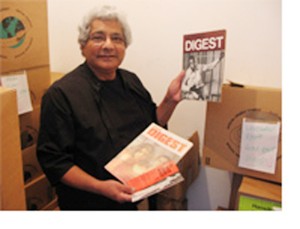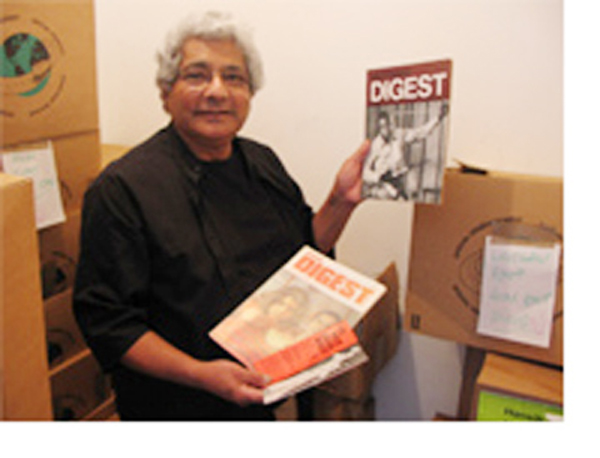Guyanese Arif Ali, the owner and editor-in-chief of Hansib Publications, who migrated to the UK many years ago, said that the career he was initially interested in – politics – was not “powerful enough” and as such he went into a field “that had more of an international scope.” That field was publishing, and so thirty-eight years ago he established Hansib, building it up from scratch. Today Hansib books can be found on every continent.

The UK-based Hansib Publications launched sixteen titles for Carifesta’s book fair which ended yesterday, and the company’s book display at the National Park was by far the largest of all those there. Despite being headquartered outside the region, the company has played a major role in the promotion of Caribbean writers, and takes a special interest in budding writers, although it does not only publish regionally.
Apart from the launch of new works, such as the one celebrating the achievements of Sir Shridath Ramphal entitled The Commonwealth and the World, there was also a re-launching of certain books, for example, Guyana from the company’s ‘Nations’ series, which had first been launched in 2006. High quality colour photographs which capture both the beauty of our interior and the culture of our people, accompany the text.
Ali said, “Carifesta is an opportunity to further widen the scope of the reach of the titles and perhaps further instil Hansib as a household name.” The local carrier is primarily Austin’s Bookstore, where all Hansib titles can be found, while selected works can also be obtained from the Karen Bacchus Bookstore, the Michael Forde bookshop and at the Cheddi Jagan International Airport.
Efforts were being made, the publisher said, to have some Hansib titles included on the CSEC English Literature reading list, as well as on the local list for secondary schools. Ali told Stabroek News that he already supplied 264 schools in Trinidad and Tobago.
Carifesta was not all sunshine and flowers for the publisher, since he felt that the organizing committee of Carifesta had “put him into the bushes.” This was a reference to the location of the book fair at the eastern end of the National Park under tents. The exposure of the books to the high humidity, Ali explained, would cause damage to the paper, and he doubted in consequence he would be able to sell copies that remained on his hands after the fair back in the UK. In addition, while this reporter was there, the rain came into the tents, providing a further challenge to those attempting to display their books.
Ali’s view was that the people ultimately responsible for Carifesta were “not capable of passing on power to those who were directly responsible for the book fair,” and as such proper planning and administration in relation to the fair were “visibly lacking.” In addition, he said, the fair was “poorly publicized by the organizing committee resulting in poor attendance and concurrently poor sales.”
When asked about the $20.5M pledged by President Jagdeo for the establishment of a regional publishing house to be located in Guyana, Mr Ali replied, “It would be a better use of that money if the government co-operates with established publishers locally instead of starting from scratch and having to re-invent the wheel.” In addition he was of the view that academics should not try to do the job of publishers and should stick to their area of expertise.
He was insistent about the importance of publishing establishments maintaining their independence, and said it was crucial for any publishing entity to steer clear of government propaganda. And in any case, he continued, people who were considering making Georgetown the literary capital of the region had missed a classic opportunity to promote the literary arts in Guyana through Carifesta, since all the books had been banished to a small space behind the stands of the National Park.
With reference to the standard of writing by the local writers Ali commented that their work was very good and their ideas were original, however, they were desperately in need of proper editing. “This may be due to the fact that they are not accustomed to working with quality editors,” he suggested.
His criticisms notwithstanding, Ali acknowledged that “it was brave of the Government of Guyana to agree to host an event of this magnitude on such short notice, [and] it was highly successful on the whole.” He also said that Carifesta had that ability to unify and that “Trinidadians, Bajans and Antigans would go home with a new respect for Guyana and her people.”

